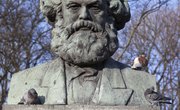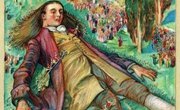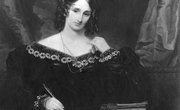The key to understanding the conflict in "Animal Farm" lies in its publishing date of 1945. George Orwell, living in England, was consumed with history and sociology relating to socialism, and he delved into conflicts about socialism versus other forms of government. He was a critic of the Soviet Union's Stalin and his brutal dictatorship. "Animal Farm" was Orwell's vehicle to combine his art with his political position. The book used literary devices, such as symbolism, allegory and hyperbole, to make vibrant points about social causes and power.
On the Farm
The farm is a microcosm of society, and Old Major, the old boar, is the voice of conscience on the farm. He influences the other animals. He calls meetings where he condemns humans and organizes the animals to revolt against their keepers. They take over the farm from Mr. Jones and rename it "Animal Farm." Once in power, the pigs eventually begin to resemble the previous human rulers, and they amend their creed to include that..."some animals are more equal than others." The book demonstrates the evil side of power, and that while in philosophy, communism appears to be supportive of all the people, it gives supreme control to only a few. The messages parallel many lessons seen in the news of the day, and the book still serves as a model for political analysis of the distribution of power in society.
Related Articles
References
Writer Bio
Connie Jankowski began writing in 1987. She has published articles in "Dog Fancy" and "The Orange County Register," among others. Areas of expertise include education, health care and pets. She holds a Bachelor of Arts in communications from the University of Pittsburgh.










